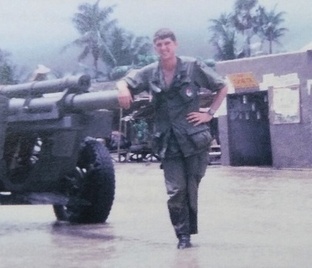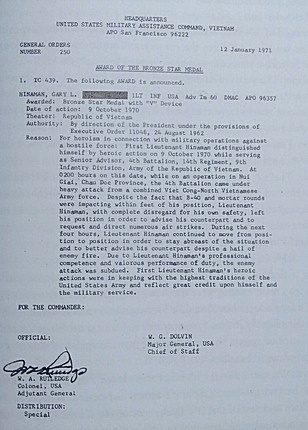By Steve Seepersaud
At age 75, Gary L. Hinaman '66, MA '72, looks at his life with gratitude for having lived the American dream. Getting there wasn't an easy journey and calling it pleasant could be considered a stretch.
As many Vietnam War veterans can attest, you can leave the conflict physically but it never leaves you mentally or emotionally. In his recent independently published book The Ranger, Hinaman provides a memoir stemming from notes he scribbled into a combat notebook at many stops throughout the war-torn Southeast Asian country.
"I want to thank my children for asking me to write this," Hinaman wrote. "I hope it gives you a sense of your family history."
Hinaman, a Johnson City, N.Y., native, earned his bachelor's degree in geological sciences from Harpur College and had started a doctoral program, receiving several draft deferrals as a student. After his uncle called him a "coward" for deferring, Hinaman joined the Army in 1968.
The son of a World War II veteran says his experience as an intercollegiate swimmer and soccer player helped prepare him for the grueling Ranger school, which included long marches on a hard dirt road, a mile-long run with full combat gear, and a 20-kilometer escape and evasion course.
"I had the upper-body strength to manage all the obstacles and the endurance to handle the running day after day with little sleep,” he wrote. “You run everywhere in Ranger school! Completion of Ranger school showed me that, although it was important to be a great athlete with physical toughness, it also required mental toughness, creativity and intelligence. Ranger school transformed me into a man."
Though the training was intense, it couldn't fully prepare him for the conditions he would encounter in Vietnam: extreme heat, having a soaking wet body for long periods of time and having to physically navigate mud, rivers and rough terrain in the jungle. You wouldn't expect an item of value to go the distance, but Hinaman carried a Brownie Instamatic camera and took photos that appear in The Ranger.
 "I didn't want my mother to worry about me," Hinaman writes. "That is why you will
always see me smiling in the slides I took, so she wouldn't worry or think I was in
danger."
"I didn't want my mother to worry about me," Hinaman writes. "That is why you will
always see me smiling in the slides I took, so she wouldn't worry or think I was in
danger."
Hinaman credits his religious faith with helping him get from one tough day to the next. Close scrapes with death — such as the time he encountered a sapper (suicide bomber) during officer's call — gave him more reason to offer thanks to God.
"I was standing just on the perimeter of the gathered officers and looked up to see a soldier about two meters away, staring at me," Hinaman wrote. "I remember we locked eyes and I nodded. After a few seconds, he turned and walked down the hill. His uniform seemed to be a bit greener than most of the men's, so I assumed he was a replacement...[The] man was a sapper...He had a change of heart and decided not to detonate his explosives. He deserted the [Viet Cong] a few days later."
 At 2 a.m. Oct. 9, 1970, Hinaman’s South Vietnamese Battalion came under heavy attack
from a Viet Cong-North Vietnamese Army combined force. As mortar rounds struck nearby,
he disregarded his own safety to request and direct numerous air strikes over a period
of four hours. For this act of heroism, Hinaman received a Bronze Star Medal with
"V" Device (notification letter pictured), one of the highest honors for a combat
officer.
At 2 a.m. Oct. 9, 1970, Hinaman’s South Vietnamese Battalion came under heavy attack
from a Viet Cong-North Vietnamese Army combined force. As mortar rounds struck nearby,
he disregarded his own safety to request and direct numerous air strikes over a period
of four hours. For this act of heroism, Hinaman received a Bronze Star Medal with
"V" Device (notification letter pictured), one of the highest honors for a combat
officer.
Mortar fire wasn’t the only danger; illnesses struck hard, too. Hinaman suffered with dysentery and was sent to a military facility where he waited several days, only to get boomeranged back to the jungle without being seen. When Hinaman returned to the United States following his tour of duty, he was treated for ulcerative colitis at the VA hospital in Syracuse.
His superiors encouraged him to make the Army a career, and he received an offer to be a general's aide. Hinaman appreciated the compliment that it was but wanted to complete his doctorate at Binghamton.
Hinaman left the program for a job at Texaco, and he owned or was a major partner in 11 oil and gas companies since going independent in 1979.
"[In] 2013, I shot a whitetail deer on our property in upstate New York and had a bad flashback while butchering it," Hinaman wrote. "I went back to the VA in January 2014 to get answers on why this was happening. Since then, it has become apparent that, although I left the war at the same point in time where the book ends, the war never left me.
"I have worked hard at trying to gain control over my PTSD. I have a great life, full of adventure, freedom and experiences that have blessed me and my family.”